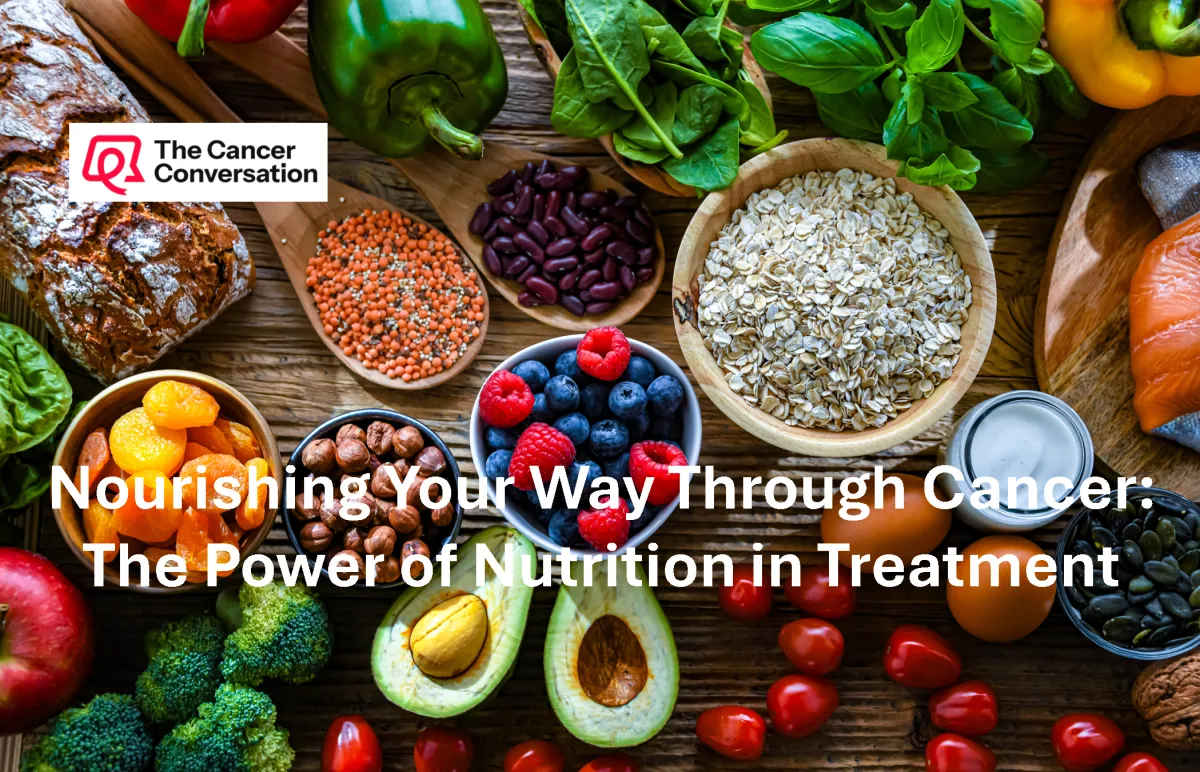
Nourishing Your Way Through Cancer: The Power of Nutrition in Treatment
Cancer can feel overwhelming, but understanding the role of nutrition in your treatment can offer a sense of control and hope. Imagine nourishing your body with the right foods to support your healing journey—this is the essence of holistic cancer treatment. Together, we'll explore how a balanced cancer recovery diet can enhance your well-being and resilience. Ready to learn how nutrition and cancer care intertwine? Learn more about the synergy of nutrition and traditional medicine for holistic health and well-being. Reach out to The Cancer Conversation for guidance on crafting a diet that works for you.
Understanding Nutrition and Cancer

Nutrition plays a crucial role in supporting cancer treatment. Understanding how food can help you through this journey is empowering.
Role of Nutrition in Treatment
Nutrition is fundamental in cancer treatment, providing necessary energy and nutrients to support the body. A comprehensive study shows that a balanced diet can help manage treatment side effects and improve quality of life.
Energy Needs: Your body's energy demands may increase during treatment. Proper nutrition helps meet these needs, maintaining strength and promoting recovery.
Immune Support: Nutrients like vitamins A, C, and E can support immune function, helping your body fight infections.
Side Effect Management: Adequate nutrition can alleviate treatment side effects such as fatigue, nausea, and weight loss.
Research indicates that tailored nutritional approaches can significantly impact recovery and quality of life. Effective nutritional strategies can be a vital component of a holistic cancer treatment plan.
Building a Personalized Cancer Recovery Diet
Creating a personalized cancer recovery diet involves tailoring your nutrition plan to meet individual needs. This source emphasizes the importance of considering specific dietary requirements.
Steps to Building a Personalized Diet:
Consult a Specialist: Work with a nutritionist experienced in oncology to assess your unique needs.
Identify Nutritional Goals: Determine what you aim to achieve with your diet, such as weight maintenance, energy level improvement, or immune support.
Plan Balanced Meals: Ensure your meals include a variety of nutrients to support overall health.
Monitor and Adapt: Continuously evaluate and adjust your diet as needed, considering changes in treatment and health status.
Personalized nutrition plans can offer support through treatment, enhancing healing and resilience. By focusing on individual needs, patients can better manage their recovery journey.
Holistic Cancer Treatment Benefits

Exploring the benefits of holistic cancer treatment can reveal how integrative health approaches contribute to well-being.
Integrative Health and Mind-Body Wellness
Integrative health combines conventional medicine with complementary therapies to address the whole person. According to research, this approach can improve mind-body wellness.
Physical Benefits: Incorporates exercise, nutrition, and therapies to support physical health.
Emotional Support: Uses techniques like meditation and yoga to reduce stress and enhance emotional resilience.
Holistic Approach: Considers lifestyle, diet, and mental health, providing comprehensive care.
Mind-body wellness focuses on the connection between physical health and mental well-being, promoting a balanced approach to cancer treatment. By integrating these elements, patients may experience improved quality of life and coping skills.
Nutritional Therapy for Emotional Resilience
Nutritional therapy is not only about physical sustenance but also supports emotional resilience. Studies show that certain nutrients can positively affect mood and mental health.
Omega-3 Fatty Acids: Found in fish, these can improve mood and reduce depression.
B Vitamins: Essential for brain health, they can help manage stress and anxiety.
Antioxidants: Protect the brain from oxidative stress, promoting mental well-being.
Incorporating the right nutrients can enhance emotional resilience, helping patients better cope with the mental stresses of cancer treatment. A holistic cancer treatment plan should include nutritional strategies to support both the body and mind.
Empowering Your Healing Journey

Empowering yourself through education and support is pivotal in your cancer journey. Real-life stories and expert guidance can provide hope and direction.
Stories of Transformation and Hope
Real-world examples of individuals who have successfully integrated nutrition into their cancer treatment can be inspiring. These stories illustrate the tangible benefits of a comprehensive approach.
John's Story: A patient who, with the help of dietary changes, managed to maintain his energy levels during chemotherapy.
Maria's Journey: Overcame treatment-related fatigue by incorporating specific micronutrients into her diet.
Anna's Transformation: Found relief from treatment side effects through a balanced diet and complementary therapies.
These narratives demonstrate the potential of combining nutrition with traditional treatments to achieve better outcomes. They highlight the importance of a supportive network and personalized care in fostering resilience and hope.
Guidance from a Trusted Advisor 🌿
Having a trusted advisor can make a significant difference in your treatment. Expert guidance can help you navigate dietary choices and integrate them into your overall care plan. This resource discusses the value of professional support in nutrition management.
Tailored Advice: Get recommendations suited to your specific health needs and treatment plan.
Continuous Support: An advisor can help you adapt your diet as your needs change.
Educational Resources: Access to information and tools can empower you to make informed decisions.
Working with professionals who specialize in nutrition and cancer care can provide the assurance and support needed for an effective recovery diet. This partnership promotes a holistic approach, enhancing both physical and emotional resilience. 🌿








